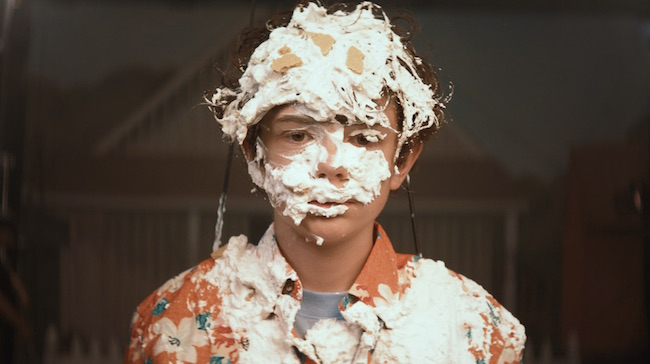
Look, I wish the best for Shia LaBeouf. He’s had a very publicly tumultuous few years. And he’s also very publicly been in rehab to get himself help. Honey Boy (which premiered here at the Sundance Film Festival), written by LaBeouf – a movie in which LaBeouf plays his own father – feels a lot like an extension of that rehab. It’s something I’m sure LaBeouf felt he needed to make to help squash whatever demons he still has about his relationship with his father. Though, I’m not exactly sure why we, the audience, are involved here. While watching, at times it felt like a stranger who had been going on a little too long about his family woes. I realize this is an important movie for Shia LaBeouf, but I’m not convinced it’s an important movie for us.
On the surface, a movie based on Shia LaBeouf’s childhood, which features LaBeouf playing his own father, is going to be inherently interesting. But another question I kept asking myself this whole movie was, “If this movie wasn’t about Shia LaBeouf, would I care at all?” And I struggled to pretend that I would. Take away the, “well, this is weird,” factor and we’ve just got a movie about a deadbeat father and his actor son who don’t seem to like each other very much.
Directed by Alma Har’el, Honey Boy opens with an adult Shia LaBeouf, played by Lucas Hedges – in the movie the character is named Otis for some reason – filming what we assume is a stunt for Transformers. Otis then goes back to his trailer and drinks himself to sleep. Then we get a bit of a montage of Shia LaBeouf’s worst moments that wind up landing him in rehab. Now, this is all pretty interesting, but we don’t get near enough of it. Instead of exploring himself, LaBeouf instead decides to explore his father.
Most of the film is set during the ‘90s as we follow a 12-year-old Otis (Noah Jupe, who is great) who is on his way to being a child television star. It is a strange juxtaposition, watching young Otis being coddled on the set of these productions, then goes home to a trailer park to live with his father (again, played by LaBeouf) who obviously has a lot of problems. He’s a recovering (and often lapsing) addict, he’s a registered sex offender so the only job he can get is as Otis’ manager, and he’s prone to violent outbursts.
The thing is, in maybe a more focused story, the relationship between Otis/Shia and his father could be summed up pretty quickly. It doesn’t take the audience long to pick up on the fact that this guy is bad news. Yet, the whole movie focuses on this aspect. We really learn nothing new about this man. We can see him for who he is pretty quickly. Though, I guess Shia LaBeouf couldn’t, and that’s why he had to play the role of his own father to learn this for himself. Again, why we all have to be there for this is a question I still have, but if LaBeouf truly got something out of this experience, then good for him. But, I’m not sure the audience watching will.
Every so often the film will jump to the present, as we see Lucas Hedges’ version of Otis in therapy. These scenes don’t go far enough and we spend too little time here. It’s basically just watching Otis go through therapy sessions and screaming alone in the woods. There’s not a lot of self-exploration here. Maybe because it’s all too soon for LaBeouf to even know. Maybe this would have been a more interesting film if he had waited a couple more years to make it.
Also, this is a strange thing to say, but here we have an autobiographical film about Shia LaBeouf in which he plays his own father and it’s a pretty straight-laced feature. You might expect it to be a little more peculiar. It may have benefited by being a little weirder.
After the premiere, LaBeouf was asked about how making this film has helped him. He mentioned that he hadn’t spoken to his father in seven years, but they are talking now. It was kind of a strange thing to hear after watching this movie and so much of the blame for LaBeouf’s woes being put on his father. And not saying that’s not true, but, again, we got that pretty early in the film. Here’s a movie about his own life, and he’s still somehow keeping us at an arm’s distance. I just wish LaBeouf had spent more time in the film examining himself. Who knows, maybe that’s next.
You can contact Mike Ryan directly on Twitter.






